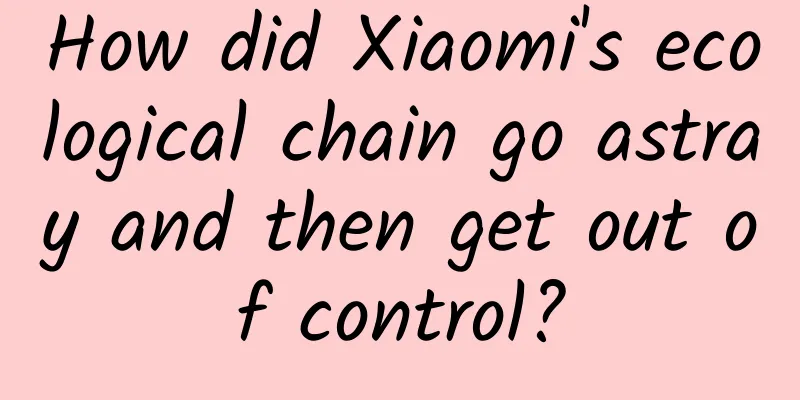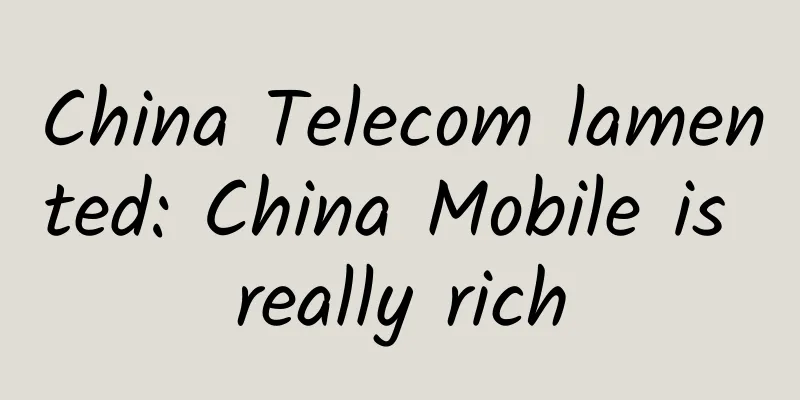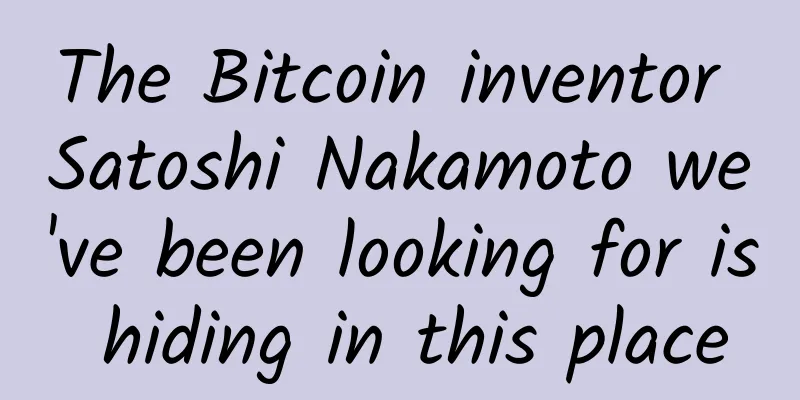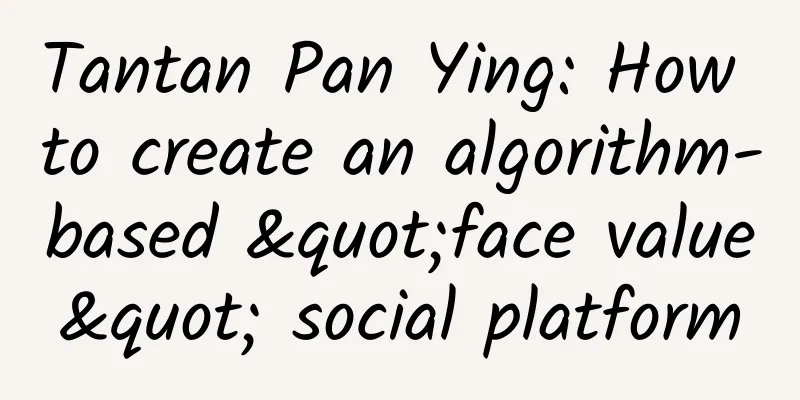How did Xiaomi's ecological chain go astray and then get out of control?

|
Lei Jun, also known as "Lei Busi", has planned a very good future for Xiaomi, planning to build Xiaomi into an ecological empire and develop an ecological industrial chain. The so-called ecological chain is: a brand forms a wide, serial product chain in a certain field. In 2013, Lei Jun launched the "Xiaomi Ecosystem" plan, which is expected to invest in 100 hardware startups within five years, with the original intention of replicating the Xiaomi model in them. By March 2016, Xiaomi already had 55 member companies, and to date, Xiaomi has sold more than 200 products, becoming the "Xiaomi Department Store" in the eyes of netizens. The model of Xiaomi Department Store, in Lei Jun's words, is "Xiaomi ecosystem is open and non-exclusive." The original intention of such an open model is very good. However, Xiaomi's ecological chain seems to be developing smart homes, but in fact it is laying out a new business model, and this business model seems to be out of control. Xiaomi's ecological chain is also a relatively advanced model in the world. How could Xiaomi, which adopts such a revolutionary ecological chain layout, lose control step by step? Ecological illusion under brand effect The reason why the ecological chain is facing loss of control is that Xiaomi's ecological layout has changed in essence. The so-called ecological chain only operates around the "Xiaomi" brand. Mobile phones, routers, and TVs are all named after Xiaomi, creating a "brand effect." In this way, Xiaomi's ecological chain is more like a gimmick of a business model. Xiaomi uses this gimmick to lay a foundation for cultivating users and insert its smart devices into every aspect of users' lives. For example, if a consumer buys a Xiaomi mobile phone, some functions will not work or the connection will be very troublesome if it is paired with a Meizu box, but if the Xiaomi mobile phone box is paired with it, the connection will be seamless. If the user feels that the price-performance ratio is good when using the mobile phone, then the user will not have a bad impression of Xiaomi TV when he encounters it, and then he will pair it with a series of Xiaomi brand products such as Xiaomi routers and Xiaomi purifiers. Xiaomi's products include smart hardware, film, accessories, clothing, bags and other products, forming what netizens call "Xiaomi Department Store". Xiaomi Department Store seems to be Lei Jun's first step in realizing the Xiaomi ecological chain, but in fact it is still paving the way for brand effect. Of course, this is also in line with Lei Jun's purpose of building the Xiaomi ecological chain: reduce the profit of good products, so that consumers form a conditioned reflex and only come to Xiaomi to buy anything they want. Although Lei Jun's blueprint for Xiaomi is unparalleled, before the brand effect is formed or when Xiaomi is still in the early stage of the ecological chain, consumers still only care about the performance and price of individual products. At present, Xiaomi has not yet achieved the ability for consumers to exclude other brands when choosing similar products. Even the smart home, which is most often mentioned in the Xiaomi ecological chain, is still an existing concept. The concept of Xiaomi smart home ecosystem is to remotely control smart home with Xiaomi mobile phone as the entry point, but many families nowadays do not need so-called smart remote control. In this environment, it is a bit exaggerated for Xiaomi to say that its products are ecological smart home. It seems that it is not easy to achieve ecological smart home. It has been more than three years since Xiaomi announced the "Xiaomi Ecological Chain", and it has only created the Xiaomi Department Store and formed the beginning of brand effect. The transition from "Xiaomi Ecological Chain" to "Xiaomi Brand Effect" is actually a marketing strategy. Xiaomi puts the products it wants to make into its member companies, which is more like the development from a company to a group. The original intention of the ecological chain seems to have lost its direction and is gradually getting out of control. The vicious cycle is causing Xiaomi to lose control Xiaomi was lost in the ecological chain, once deviated, and then went out of control. Perhaps because of the stagnation of the mobile phone business, Xiaomi can only lay out the story of "ecosystem" to attract investment and maintain Xiaomi's high valuation. However, this distracts Xiaomi's attention and does not improve the core competitiveness of Xiaomi mobile phones at all. Therefore, it needs to lay out a larger "ecosystem", forming a vicious circle. If the story of "ecosystem" cannot be laid out, then the entire phenomenon of Xiaomi's false high valuation will collapse. After the ecosystem is laid out, more and more Xiaomi products other than Xiaomi mobile phones need to be produced. Although such a layout seems good and cooperation with various companies can achieve a win-win effect, the more products there are, the easier it is to pass off fake products as genuine ones. Therefore, Xiaomi's products other than mobile phones generally have low prices, high interchangeability, and a small audience. The core of the so-called ecosystem is still Xiaomi mobile phones, and the mobile phones are being overtaken by peers. According to IDC data, Xiaomi's mobile phone sales in 2016 plummeted by 31.9% in the first quarter, 38.6% in the second quarter, and 42.2% in the third quarter, dropping from the first place in domestic sales to the fifth place. According to the current development situation, the evaluation that "Xiaomi has good sales and is in the leading position in the industry" has become a thing of the past. The glory of mobile phone sales has stayed in the past. Xiaomi still needs to look to the future development, so the Xiaomi ecological chain has become Xiaomi's hope to continue to be the industry leader. However, the development of Xiaomi's ecological chain is not so smooth. Xiaomi's self-operated TV has been suppressed by LeTV TV; Xiaoyi, the best member company of Xiaomi's ecosystem, is said to have terminated its cooperation at the beginning of the year; and Huami, which has developed well, has also launched a watch. Perhaps with the decline in Xiaomi's mobile phone sales, the defects of this ecological chain model will become more and more obvious. It is precisely these defects that show that Xiaomi has not yet transformed from a marketing company to a real technology company. Marketing companies mainly rely on marketing methods, and if their peers learn their tricks, they will divide their users; while real technology companies pay more attention to R&D and production links, because technology and quality cannot be copied. If Xiaomi does not clearly recognize the company's positioning or reflect on the flaws in its existing ecological model, it will go further and further down the wrong path, causing its ecological chain to be completely out of control or even collapse and become difficult to recover. Can Xiaomi reverse the out-of-control situation of its ecological chain? If Xiaomi finds that its ecological chain is out of control and starts to make up for it, can it change its behavior in the ecological chain and reverse the situation of Xiaomi's ecological chain being out of control? Although the out-of-control of Xiaomi's ecological chain has not yet reached the point of "entering the terminal stage", the various advantages in the early stage no longer exist. It is by no means easy to reverse the out-of-control situation. Xiaomi wants to reverse the situation of out-of-control ecological chain. First, it needs to clarify the correct model of ecological chain, which emphasizes and values downstream consumers and truly allows users to enjoy the fun of technology. Secondly, it needs to use the inherent advantages of the Internet to judge the needs of consumers in the market and launch products that may become popular in the market. Finally, it needs to expand the scope of smart home technology, improve the level of competition in the industry, and develop products to the level of Xiaomi mobile phones. This model is closer to the service provider model than the ecological chain development model. The premise of building a good ecological chain is to be a good service provider first, change Xiaomi's attitude towards product development, forget past honors, improve the aesthetic ability of product design, launch exquisite mobile phones, and reduce the probability of the ecological chain disintegrating. But will Xiaomi really realize its deviation from the ecological chain and reflect on it? Lei Jun once said that Xiaomi's ecological chain is divided into three layers: the first layer is smart hardware; the second layer is the content industry ecological chain; and the third is cloud services. In the hardware ecological chain, he invested in hardware startups; in the content ecological chain, he invited Chen Tong to invest in Youku and iQiyi; in cloud services, he invested in Kingsoft and 21Vianet. Even though Lei Jun has planned the Xiaomi ecological chain so clearly, this so-called ecological chain seems to have nothing to do with ecology, and there is no sign of openness in the Xiaomi ecological chain. The reason why Xiaomi's ecological chain is said to have nothing to do with the ecosystem is that the products produced by the member companies developed by Xiaomi are sold under the name of Xiaomi, and the major shareholders of the member companies are almost all Xiaomi. This form is more like developing a group. Although Xiaomi has announced that it does not have a controlling stake, this form has nothing to do with the ecosystem, or it can be said that this is a disguised form of controlling stake. I don't know if Xiaomi has noticed the flaws of this model. The time when Huami and Xiaoyi were preparing to go solo is the best example. Xiaomi wants to develop its ecological chain by holding shares in disguise in the fastest-changing Internet industry. The final result is that its mobile phone sales are insufficient to support the company, its products are outperformed by other brands, and its brand channels will also face a serious blow. However, Xiaomi does not seem to be aware of this crisis. It is still unknown how Xiaomi will solve the situation of out-of-control ecological chain and whether it can reverse the current out-of-control situation. In general, Xiaomi's ecological chain is out of control. It did not happen overnight. It lost its original intention to turn the ecological chain into a brand effect. It went astray and refused to change its mind. Moreover, Xiaomi has not shown the idea of changing its mind in the ecological chain. This series of measures has made Xiaomi's ecological chain out of control step by step. Whether Xiaomi can make a beautiful comeback in the future and become a powerful dragon from now on, we will have to wait and see. As a winner of Toutiao's Qingyun Plan and Baijiahao's Bai+ Plan, the 2019 Baidu Digital Author of the Year, the Baijiahao's Most Popular Author in the Technology Field, the 2019 Sogou Technology and Culture Author, and the 2021 Baijiahao Quarterly Influential Creator, he has won many awards, including the 2013 Sohu Best Industry Media Person, the 2015 China New Media Entrepreneurship Competition Beijing Third Place, the 2015 Guangmang Experience Award, the 2015 China New Media Entrepreneurship Competition Finals Third Place, and the 2018 Baidu Dynamic Annual Powerful Celebrity. |
<<: Driverless cars come up with new black technology: cars stop when pedestrians wave
Recommend
Some thoughts on the design of payment platform architecture
My first task in my previous company was to devel...
Super dry goods | How to successfully hold a press conference without any basic knowledge!
Planning to executing a press conference is a very...
How do product people quickly write in-depth product experience reports?
In this article, the author analyzes several high...
How much does it cost to attract investment with the Zhanjiang Real Estate Mini Program?
How much does it cost to attract investment throu...
Xiaohongshu Promotion丨How to quickly create popular notes!
I have a strong interest in customer acquisition,...
LCD screen manufacturers are busy with the World Cup big screen, 4K becomes the favorite
As one of the most influential international spor...
This "brain killer" is difficult to cure!
I am a neurosurgeon. Ordinary people sometimes co...
When is the healthiest time to eat apples? What does the research say?
Apple is a fruit known for its health benefits, a...
The tremendous power of B2B operations, from building a value chain to humanizing the carrying system!
After all fields of B2C have entered the red ocea...
A Survival Guide for People with Allergies
July 8th is World Allergy Day. Nasal congestion, ...
Jiaqi: New Era Chat Black Technology - Hunting Heart Law
Jiaqi's "New Era Chat Black Technology -...
What kind of feelings are needed to play Internet thinking
Today's Internet industry is becoming more an...
There are so many types of mobile phone fast charging, which one is the safest?
A few days ago, Meizu released the third-generatio...
May 4th Youth Day丨100,000 meters of youth! How many meters are you at?
Youth is full of vitality Spreading down and taki...
In addition to catching up on sleep after staying up late, you can also choose to "drink a cup of tea"
After staying up late, many people think of "...









